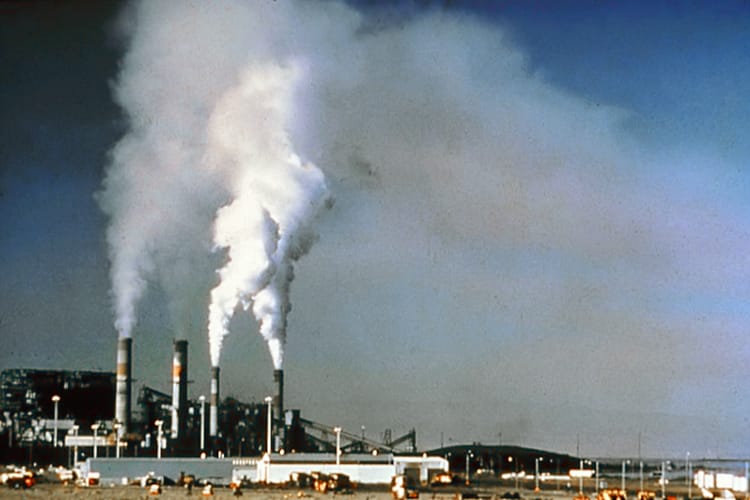Green Confusion: The Metaphysical and Political Failures of Ecology

We are living in an ecological emergency. The combination of greenhouse gas emissions and pollution is rapidly degrading the life-sustaining capacities of earth ecosystems. Eco-degradation is no longer an issue for our grandchildren to worry about as we are bombarded by extreme weather events and a 6th mass extinction of life on earth. Humanity needs to act now to prevent breezing past rapidly oncoming tipping points in which irreparable damage to ecosystems' ability to support life will be done.
Acting, however, as emphasized by social scientist Immanuel Wallerstein, requires analysis of social reality. While climate activists have been carrying out relatively successful direct-action campaigns, the movement for environmental justice has become increasingly confused at the theoretical level impairing its ability to work towards a just solution to the climate emergency. This confusion largely issues from a thin political ideology known as "ecologism". Thin ideologies as opposed to thick ones are ideologies which have a broader set of principles that can be combined with a more definitive host ideology. For instance, feminism is broad enough that it can be combined with any more specific host ideology which would countenance gender equality allowing for conservative feminism, liberal feminism, socialist feminism, and Anarcha-Feminism.
Thus ecologism has been combined with other ideologies producing eco-socialism, eco-Anarchism, eco-liberalism, ect. The basic thesis of ecologism is that the ecological emergency is the result of human beings failing to respect the boundaries of nature and engaging in a 'promethean' project of unending production and growth which destroys natural equilibrium. Arguably like all ideologies (thick, or thin) ecologism comes with its own metaphysics (a view about the broad structure of existence) and ethics (a view about right and wrong). The metaphysics and ethics of ecology are both referred to as "holism". Metaphysical holism is the view that nature is constituted by an interconnected set of balances that mutually reinforce harmonious existence across ecologies. Ethical holism is the view that the right way for human beings to relate to the natural environment is to limit their activities within the parameters of ecological balance.
For ecologists the origin of the ecological emergency is in the failure of human beings to observe ethical holism in our productive relationship to the environment. By constantly expanding the productive forces of industrial civilization without regard to ecological limits the undifferentiated mass consumption of human beings has put the planet's ecosystem at risk. Thus, the solution to the ecological emergency is ethical holism in which the productive forces of industrial society are reigned back in along the lines of ecological limits and balance. A natural corollary of ecologism is degrowth which argues that the basis of the ecological emergency is constant growth in material wealth, consumption, and production, with the solution being adherence to ways of life and forms of production and consumption which reverse growth along these lines.
Ecologism is divided between deep ecology which tends to be more critical of the very existence of industrial civilization and other forms of ecology which aim to make industrial civilization compatible with ecological balance. Murray Bookchin's social ecology proposes a communal social contract in which citizens respect production and consumption norms that fall within ecological limits which define the common good on a directly democratic basis. Perhaps the most extreme form of deep ecology is found in primitivism which rejects industrial civilization in favor of the reinvention of pre-civilized ways of life that don't rely on modern science and technology.
Because ecologism criticizes capitalism's reliance on constant innovation within the forces of production Marxists have developed eco-socialism which aims to combine Marx's criticism of capitalism's industrial degradation of ecology with a form of socialism that utilizes a rational collective plan of producers that respects ecological limitations, with eco-Anarchism largely being informed by Bookchin's social ecology. Eco-socialism and Eco-Anarchism represent perhaps the height of the confusion inherent to ecology on both the metaphysical and political level. Karl Marx's approach to green politics was analysis of the human/nature metabolism. Marx observed through the materialist method of social theory he shared with his Anarchist opponents that human society, sustained by social production and social labor, has a metabolic relationship to nature analogous to metabolic biological processes.
Human beings constantly transform the natural environment to meet their needs and in turn are transformed by it. Human beings develop industry and agriculture leading to a very different eco-system which in turn leads to very different human beings as a result of human life within this transformed ecology. This is made possible by the fact that nature constantly transforms itself. GWF Hegel, the philosopher who most influenced the materialism of Karl Marx and the Anarchist movement, thus pointed out that human culture emerges from nature since human beings sustain themselves within the natural environment. For Marx and the Anarchists who were influenced by the Darwinian revolution in biology the fact that humanity's transformation of nature is a result of nature's transformation of itself is underscored by the fact that the origin of species is in natural processes of development.
Thus for Anarchists and Karl Marx the transformation of nature via innovations in the productive forces initiated by human beings is a basic aspect of human development, the cessation of which means the death of humanity and further nature itself is constantly in transformative flux. This humanist naturalism cannot be reconciled with the static nature of ethical and metaphysical holism. Eco-socialists feel themselves caught in this bind having to insist that Marx was not a promethean, despite the fact that Marx's conception of the good life is the unending expansion of the productive forces to open horizons for humanity. There can be no free association of producers when human activity is subject to an abstract and static conception of natural limitations. This was implicitly understood by Bookchin, when he broke his social ecology away from Anarchism after Anarchists insisted that a social contract enforced by local citizenship structures carved out of municipal states was not compatible with the Anarchist notion of a free society.
Ironically the holism of ecology is an extension of the scientific worldview of bourgeois society which expands productive forces to the dismay of the ecologists. Nature is conceived as a static pool of resources from which humanity draws and thus as essentially separate from the dynamic human activity which transforms it. This is ironically a worldview which Marx identified as at the heart of the ecologically degrading aspects of bourgeois society. Marx sees bourgeois society as characterized by a metabolic rift in which industry disposes of nature according to profit imperatives, rather than imperatives of sustaining biological life. This means bourgeois society is incapable of recognizing the interconnection between nature and human life and sets nature aside as a mere pool of resources, rather than the basis of survival for sentient beings. In different terms Anarchist Communist Peter Kropotkin also recognized this ecologically corrosive aspect of bourgeois industry.
It is thus no surprise that atmospheric and terrestrial pollution is now threatening the life supporting capacities of ecological systems. As Wallerstein observes capitalist firms could never cover the entire cost of replenishment of resources and cleaning up pollution. Now that social movements have pressured the state to use taxation against corporations and capitalists in order to cover these costs and limited the ability of capitalists to externalize ecological costs of production, hard limits have been placed on the profitability of the capitalist economy. The ecological emergency is thus a feature of the wider structural crisis of the capitalist world-system.
Ecologism is bound up in what Huwe De Paoli calls the popular Anthropocene. The Anthropocene was first hypothesized by scientists as a geological epoch taking shape since the industrial revolution in which the geologic record would display marks of human impact on the environment long after the epoch is over. The concept has then been generalized within environmental politics to refer to the impact that human economic activity is having on the environment. However, the dominant political narrative is that the Anthropocene is the result of the consumption habits of the undifferentiated mass of humanity. No distinctions of class, race, sex, ability, or political power are made by the popular Anthropocene in assigning responsibility for the ecological crisis. This is despite the fact that wealthy nations and large industries are mostly responsible for the damage.
In mainstream politics the popular Anthropocene is mainly a justification for efforts at greening the capitalist world-system through market mechanisms like carbon capture which essentially incentivize further emissions for those that can pay for them while the issue of terrestrial as opposed to atmospheric pollution is ignored altogether. While ecologists imagine that they have the radical solution in contrast to green capitalism, they in fact have barrowed their entire narrative from the popular Anthropocene. Instead of differentiating the ecological crisis along lines of class and political power ecologism buys into the notion that it is human activity and consumption writ large that poses a threat to the life-sustaining aspects of eco-systems because too much human activity and consumption doesn't respect ecological harmony (read; ecological stasis).
Instead of talking in qualitative terms with reference to human fulfillment and sustenance e.g. what kinds of social relations are ecologically sustainable, ecologists talk in bourgeois quantitative terms, familiar to the capitalist market e.g. what is the abstract amount of human productive activity that is ecologically sustainable. This is why even 'eco-socialists' who are supposed to be deploying Marx's analysis of environmental politics talk of socialism "within ecological limits". This quantitative as opposed to qualitative framing of the crisis makes ecologism a fertile conceptual space for green capitalism. If the issue is one of too much pollution and not one of the ecological qualities of the mode of production itself, then green capitalists can busy themselves with superficial carbon capture and cap and trade solutions while the main issue goes unaddressed.
Ecology is perhaps at its most chauvinist in the form of degrowth, which explicitly states that the ecological crisis can only be solved by cutting back on the production of social wealth and consumption on a planetary scale. The degree to which production and consumption are curtailed is the degree to which human agency is limited as human activity is supported by production and consumption. Thus, framing the ecological crisis in quantitative terms ecologists in the degrowth camp have produced a justification for limiting access to material wellbeing for all of humanity (billions of whom languish in poverty) for the good of the planet. Not only this, but degrowth is not self-consistent. The scientific developments that would be needed to monitor and scale back pollution, presumably developments degrowthers don't want to do without, themselves require an expansion of the forces of production.
Today the global left is fragmented and confused. It must overcome this state if it is to become a mass movement for replacing capitalism with something better. One source of this confusion is ecologism. Ecologism, in fact, is merely the most recent source of confusion, the so-called eco-socialists reject Anarchism in favor of dogged insistence on seizing state power, with nothing tangible to avoid a repeat of 20th century state socialism, other than chastising communist regimes for prometheanism and abstract insistence on "democracy". It must be overcome in favor of the humanistic naturalism of Karl Marx and the classical Anarchists.
Sources and Further Reading
Green Ideology, Humphrey
Refusing Ecocide, Carroll
Bookchin Breaks with Anarchism, Beihl
Against The Post-Left, Tompkins
The Philosophy of Anarchism, Tompkins (Kinna's article cited in the sources section is an otherwise informative source on Kropotkin's ecological ideas that makes the erroneous comparison of his views with degrowth.)
World-Systems Analysis: An Introduction, Wallerstein
Deepening of The World-System Crisis, Grinin and Grinin
The Popular Anthropocene in Global Climate (Dis)Governance, Huwe de Paoli
Sociology The Basics, Plummer





